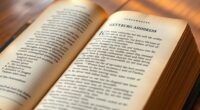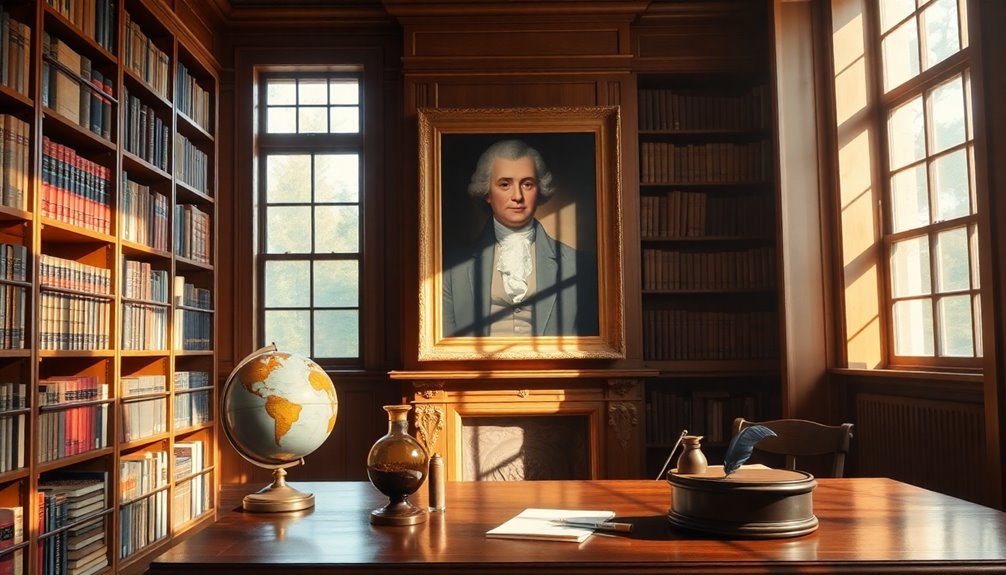Churchill crafted timeless lines by skillfully using rhetorical devices like repetition and vivid imagery to reinforce his messages. He tailored his words to resonate with the emotional and historical context of Britain during World War II, inspiring unity and resilience. His mastery of speech was rooted in understanding his audience and the power of language. If you’re curious about how he combined strategy and emotion to create unforgettable quotes, there’s more to uncover below.
Key Takeaways
- Churchill used rhetorical devices like parallelism, repetition, and vivid imagery to emphasize key messages and enhance memorability.
- He tailored his language to resonate emotionally, inspiring unity and resilience during Britain’s darkest hours.
- The historical context of threats like Nazi Germany shaped his choice of powerful, rallying words.
- Strategic use of rhythmic cadence and emotional appeal made his lines impactful and timeless.
- Churchill’s mastery combined rhetorical skill with understanding of audience psychology, creating enduring and inspiring quotes.

Have you ever wished for a simple way to find and share inspiring quotes instantly? If so, you’re not alone. Throughout history, great speakers and writers have crafted lines that resonate long after their time. Winston Churchill, in particular, mastered this art, creating memorable phrases that still echo today. His ability to craft lines for the ages wasn’t luck; it was a skill grounded in understanding rhetorical devices and the historical context surrounding his speeches and writings. When you analyze Churchill’s quotes, you realize that he carefully employed rhetorical devices—such as parallelism, repetition, and vivid imagery—that make his words stick in your mind. These devices serve to emphasize his points, evoke emotion, and make his messages more memorable. For example, his famous “We shall fight on the beaches” speech leverages repetition and rhythmic cadence, heightening the sense of resolve and unity. But understanding the rhetorical devices alone isn’t enough—you also need to contemplate the historical context in which Churchill delivered his lines. Analyzing the speechwriting techniques he used reveals how he crafted compelling and impactful messages. Churchill’s speeches weren’t created in a vacuum. They were responses to the tumultuous events of his era—the threat of Nazi Germany, World War II, and the struggle for Britain’s survival. This historical context shaped his language, making his words not only powerful but also deeply relevant. When you study his speeches, you see how he tailored his rhetoric to rally a nation on the brink of despair. His words, infused with the gravity of the time, became symbols of hope and resilience. Churchill’s mastery was in the way he combined rhetorical devices with his understanding of his audience’s emotional state and the political landscape. His speeches weren’t just well-crafted lines; they were strategic tools designed to motivate, unify, and inspire action. Recognizing this connection helps you appreciate why his quotes endure—because they were born from a keen awareness of both language and circumstance.
Frequently Asked Questions
How Did Churchill Develop His Unique Rhetorical Style?
You can see that Churchill developed his unique rhetorical style through mastery of speechwriting techniques and effective use of rhetorical devices. He carefully crafted his speeches to inspire and motivate, often using repetition, vivid imagery, and powerful metaphors. By practicing these speechwriting techniques, he created memorable lines that resonate deeply, making his rhetoric compelling and timeless. His deliberate approach allowed him to connect with audiences and leave a lasting impact.
What Were Churchill’S Most Famous Speeches?
Your mind might imagine Winston Churchill’s speeches as legendary, and they are. His most famous speeches, like the “We shall fight on the beaches” address, showcase masterful use of propaganda techniques and diplomatic rhetoric. You see how he rallied Britain during its darkest hours, inspiring resilience. His speeches became a powerful tool to sway public opinion, turning words into weapons of hope, courage, and unwavering determination.
How Did Churchill’S Quotes Influence Public Morale?
You see, Churchill’s quotes profoundly boosted public morale during tough times by using propaganda techniques and powerful linguistic devices. His speeches inspire hope and resilience, making people believe in victory. You’re influenced by his masterful use of repetition, vivid imagery, and emotional appeal, which rally the nation’s spirit. These quotes become symbols of strength, uniting people and helping them endure hardships with renewed determination.
Did Churchill Write His Speeches Himself?
You might wonder if Churchill wrote his speeches himself. He was deeply involved in the speechwriting process, collaborating closely with skilled speechwriters. Churchill used rhetorical techniques like repetition and vivid imagery to craft powerful lines. While he provided the core ideas, his team refined the language. This partnership helped him deliver impactful speeches that resonated with audiences, combining his leadership vision with expert speechwriting skills.
What Role Did Churchill’S Background Play in His Speechwriting?
Your question about Churchill’s background reveals how his personal history and cultural influences shaped his speechwriting. His education and experiences gave him a strong grasp of history, literature, and rhetoric, which he used to craft compelling lines. Cultural influences from Britain’s wartime spirit and his own military service inspired his tone and themes. You can see how his background fueled his ability to inspire and rally people through powerful speeches.
Conclusion
As you reflect on Churchill’s mastery, you realize how coincidence often threads his words through history’s fabric. His quotes, born from moments of crisis, seem to find us just when we need them most—like a message waiting in the wings, ready to inspire. It’s as if fate and insight entwine, shaping lines that echo through time. In those perfect moments, you see how words become timeless, crafted not just by chance, but by a master’s touch.








